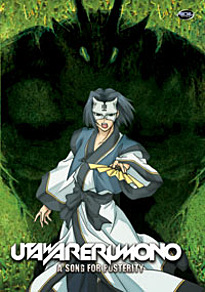Review
by Theron Martin,Utawarerumono
DVD 6 - A Song for Posterity
| Synopsis: |  |
||
The Kunekamun have been left shaken by their encounter with the transformed Hakuoro, but Kuuya presses on, now convinced that only domination can earn her people peace. While Eluluu cuts a deal and Genjimaru seeks a way to save Kuuya from going down the wrong path, Dii makes his power play, drawing Camus into the fray. Even if flashback-prone Hakuoro and the forces of Tuskuru can rally to defeat the Kunakamen and their Avu Kamu, though, Dii and his “daughter” still remain, as does the secret of Hakuoro's true identity and how that truth will affect everyone. Before all is said and done Hakuoro must confront his forgotten past and the connection binding him and Dii together. |
|||
| Review: | |||
Never a stand-out series but never bad, either, Utawarerumono chugs along its merry way through an intense, well-paced span of four final episodes which wrap up the story in a sensible fashion while also dishing out a smorgasbord of tasty revelations. Want to know who Hakuoro really is and what's up with those monstrous transformations? Check. Mystery of who Dii is? Solved. What makes Camus special? Revealed. Toss in the weighty implications of more sci-fi flashbacks and some heavy drama you have a highly involving conclusion that should satisfy any fan of the series. Not everything turns out well for characters you may have grown to like, but a great sense of dramatic timing and a proper conclusion and epilogue should amply balance out the more bittersweet elements. Throughout the series tactical planning and massed battles have been staples of the various story arcs, but as the Kunekamun arc draws to a close the attention shifts to the plot line that has always been a subtext to everything in the series: Hakuoro's true identity and how it impacts everything. Bits and pieces of all of the previous story arcs come together, and new flashbacks explain some missing details, as the events and revelations of those final three episodes cast many scenes from earlier in the series in a new light and bring the overall story together into one unified whole. Mixed throughout is the character development which has been a cornerstone of the series. It may have its origins in an ero game, but with these final episodes the series steps beyond that mold. Little can be said about the artistry or animation that has not been said in earlier reviews, other than that these episodes are more graphic than the norm and at least one scene seems to have been artistically inspired by End of Evangelion. Oriental Light and Magic, the team responsible for the animation production, maintains quality standards through to the end, which includes appealing character designs and battle scenes sufficiently animated to step above the shortcut-fests seen in other series. Although a minimal amount of massed battles and troop movements occur in this volume, the CG animation still appears in flames, plumes of smoke, and the dark energy involved in Hakuro's transformations, which usually integrates well with the regular animation. The soundtrack, which has occasionally been prone to overdramatization, consistently hits the mark in this volume, especially in the vocal-supported numbers in episodes 24 and 26. The new song “Kimi ga Tame” sung by opener performer Suara, which starts as an insert song and continues into the final episode's closer, offers a gentle, appropriately melancholy sound, while the original opener and closer otherwise remain unchanged. Dub quality remains consistent with earlier volumes, with appropriate electronic modifications made for Hakuro and Dii's voices in their monstrous forms; if you have at least tolerated the dub before, you still will here. The Japanese dub may handle the most emotional parts slightly better, but the English dub is otherwise sufficient and offers no let-down in its scripting. ADV has never shorted this series on Extras, and the final volume offers just as full a boatload of them as any previous volume. Typical Extras like clean opener and closer and a brief character art gallery accompany typical-for-the-series extras like a glossary (this time updated to reflect the revelations of the last volume, so don't read it before seeing the series through to the end), extended episode previews, and another installment of “Utawarerumono Q & A,” the latter of which pokes fun at the series' ero game origin. Also present are a promo for the PS2 game version of the series and the final installment of Omake Theater, which provides a very funny extension of the omake episode seen in Volume 5, with Hakuoro still dodging responsibility over the incident with Touka's beloved doll. The end of the series does not resolve everything, as it insufficiently explains the sci fi angle, but that is a minor negative in light of everything else the final volume does right. This is the series at its best, and how well it wraps up slightly elevates the overall evaluation of the series. If you want a generally serious fantasy tale full of lively characters and a good balance of action, tactics, and drama then give this one a chance. |
| Grade: | |||
|
Overall (dub) : B+
Overall (sub) : B+
Story : B+
Animation : B+
Art : B+
Music : B+
+ Wraps up the story well, good timing and pacing. |
|||
| discuss this in the forum (9 posts) | | |||
| Production Info: | ||
|
Full encyclopedia details about Release information about |
||